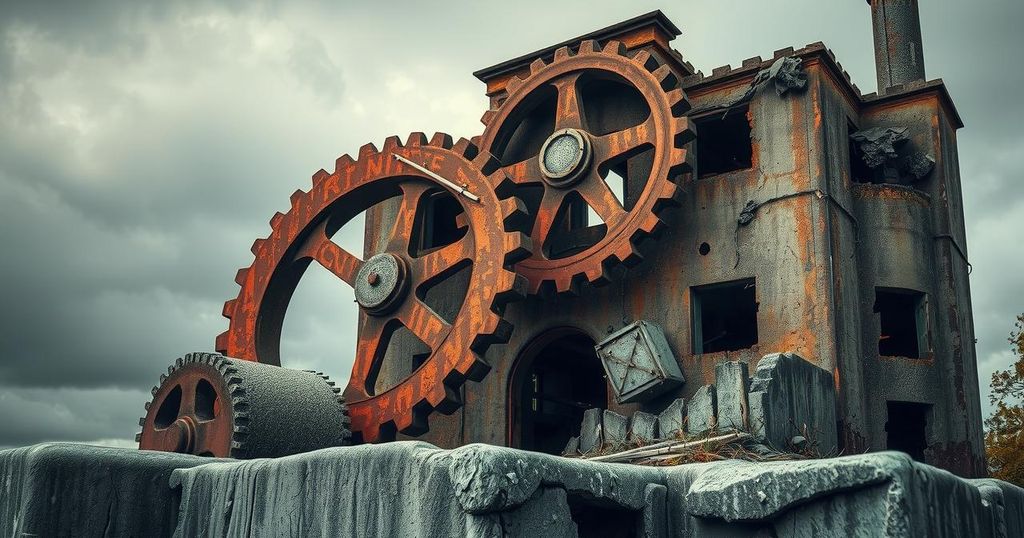Iran’s Economy Faces Devastation Amid Trump’s Renewed Sanctions

Iran’s economy is deteriorating rapidly due to high inflation, a failing currency, and increased poverty for millions. Following President Trump’s reinstatement of sanctions under a “maximum pressure” campaign, the economic situation has worsened. Reports indicate inflation is above 45 percent, with significant rises in food and housing costs, while tensions with the U.S. regarding Iran’s nuclear program persist.
Iran is facing a severe economic crisis characterized by soaring inflation, a plummeting currency, and an increase in poverty that affects millions. This downward spiral worsened following U.S. President Donald Trump’s reimplementation of a “maximum pressure” campaign, which tightened sanctions aimed at severely impacting Tehran’s economy. Iran’s Foreign Ministry has been contacted for comments regarding this pressing situation.
The significant rise in prices for basic needs, including food and housing, poses a daily challenge for countless Iranians. As reported by the Statistical Centre of Iran, inflation exceeds 45 percent, and approximately half the population now lives in poverty. This growing frustration has placed increasing pressure on Iranian leadership to find a solution.
Under Trump’s directives, the U.S. has reimposed sanctions with the intent of crippling Iran’s economy, and these sanctions are already being felt across the nation. While Iran struggles with the economic fallout, Trump has indicated a willingness to negotiate, although he maintains threats of further sanctions in response to Iran’s advancing nuclear capabilities.
Afshin Molavi, a Senior Fellow at the Foreign Policy Institute, remarked, “Iran’s economy is battered. It faces dire energy shortages, owing mainly to its own mismanagement and corruption, but also due to sanctions.” These factors have compounded Iran’s economic difficulties.
In the latest developments, Iran’s currency has plummeted to a record low of 928,000 rials per dollar, marking a more than 6 percent decline in one day. This sharp currency devaluation exacerbates inflation, depleting savings and rendering imported goods unaffordable for citizens.
Housing costs in Tehran have seen astronomical increases, with rental prices surging 24-fold in the past twelve years and real estate prices skyrocketing over 37 times. Meanwhile, wage increases have not kept pace, leading many to find it impossible to afford even basic housing.
The Iranian oil sector, crucial for the economy, faces severe threats from renewed sanctions. President Trump has signed directives reinstating his “maximum pressure” strategy with the aim of reducing Iran’s oil exports to zero, substantially impacting governmental revenue generated from oil, which accounts for nearly half of the nation’s income.
Afshin Molavi noted, “Iran’s oil revenues have been able to paper over many of the structural faults in the economy. Oil revenues account for some 40 percent of government revenues and an even larger share of hard currency earnings.”
While President Trump shows a potential willingness to negotiate, he articulately warned that Iran must not pursue nuclear weapons, stating, “They cannot have one thing—they cannot have a nuclear weapon. And if I believe they are pursuing one… it will be very unfortunate for them.”
Iranian President Masoud Pezeshkian stated, “The current economic challenges are beyond the government’s immediate control, and we are exploring all possible avenues to mitigate the impact on our citizens.” There remains uncertainty regarding potential diplomatic efforts or further conflict in the region.
In conclusion, Iran’s economy is in a precarious state, driven by both internal mismanagement and external sanctions aimed at weakening the government’s financial capabilities. The severe inflation and skyrocketing costs for essential goods create widespread hardship for the Iranian population, prompting calls for governmental intervention. As diplomatic negotiations are suggested by U.S. leadership, the future remains uncertain for Iran in light of overwhelming economic challenges. Moving forward, it remains critical for Iranian authorities to devise effective strategies to address these economic difficulties while navigating the complex political landscape both domestically and internationally.
Original Source: www.newsweek.com








